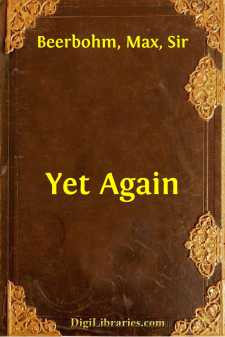Literary Collections
- American 84
- Ancient, Classical & Medieval 14
- Asian 1
- Australian & Oceanian 1
- Canadian 55
- Continental European 121
- English, Irish, Scottish, Welsh 179
- Essays
- General 24
- Letters 46
- Middle Eastern 1
Essays Books
Sort by:
by:
Charles Cotton
Few things, in comparison of what commonly affect other men, move, or, to say better, possess me: for 'tis but reason they should concern a man, provided they do not possess him. I am very solicitous, both by study and argument, to enlarge this privilege of insensibility, which is in me naturally raised to a pretty degree, so that consequently I espouse and am very much moved with very few things....
more...
by:
Max Beerbohm
THE FIRE If I were 'seeing over' a house, and found in every room an iron cage let into the wall, and were told by the caretaker that these cages were for me to keep lions in, I think I should open my eyes rather wide. Yet nothing seems to me more natural than a fire in the grate. Doubtless, when I began to walk, one of my first excursions was to the fender, that I might gaze more nearly at...
more...
by:
Charles Cotton
I never yet saw that father, but let his son be never so decrepit or deformed, would not, notwithstanding, own him: not, nevertheless, if he were not totally besotted, and blinded with his paternal affection, that he did not well enough discern his defects; but that with all defaults he was still his. Just so, I see better than any other, that all I write here are but the idle reveries of a man that...
more...
by:
Charles Cotton
It is very easy to verify, that great authors, when they write of causes, not only make use of those they think to be the true causes, but also of those they believe not to be so, provided they have in them some beauty and invention: they speak true and usefully enough, if it be ingeniously. We cannot make ourselves sure of the supreme cause, and therefore crowd a great many together, to see if it may...
more...
by:
Charles Cotton
They who write the life of Augustus Caesar,—[Suetonius, Life of Augustus, c. 25.]—observe this in his military discipline, that he was wonderfully liberal of gifts to men of merit, but that as to the true recompenses of honour he was as sparing; yet he himself had been gratified by his uncle with all the military recompenses before he had ever been in the field. It was a pretty invention, and...
more...
by:
Charles Cotton
Having considered the proceedings of a painter that serves me, I had a mind to imitate his way. He chooses the fairest place and middle of any wall, or panel, wherein to draw a picture, which he finishes with his utmost care and art, and the vacuity about it he fills with grotesques, which are odd fantastic figures without any grace but what they derive from their variety, and the extravagance of their...
more...
by:
Charles Cotton
He seems to me to have had a right and true apprehension of the power of custom, who first invented the story of a country-woman who, having accustomed herself to play with and carry a young calf in her arms, and daily continuing to do so as it grew up, obtained this by custom, that, when grown to be a great ox, she was still able to bear it. For, in truth, custom is a violent and treacherous...
more...
by:
Charles Cotton
DEFENCE OF SENECA AND PLUTARCH The familiarity I have with these two authors, and the assistance they have lent to my age and to my book, wholly compiled of what I have borrowed from them, oblige me to stand up for their honour. As to Seneca, amongst a million of little pamphlets that those of the so-called reformed religion disperse abroad for the defence of their cause (and which sometimes proceed...
more...
by:
Charles Cotton
Well, but some one will say to me, this design of making a man's self the subject of his writing, were indeed excusable in rare and famous men, who by their reputation had given others a curiosity to be fully informed of them. It is most true, I confess and know very well, that a mechanic will scarce lift his eyes from his work to look at an ordinary man, whereas a man will forsake his business...
more...
by:
Charles Cotton
By how much profitable thoughts are more full and solid, by so much are they also more cumbersome and heavy: vice, death, poverty, diseases, are grave and grievous subjects. A man should have his soul instructed in the means to sustain and to contend with evils, and in the rules of living and believing well: and often rouse it up, and exercise it in this noble study; but in an ordinary soul it must be...
more...











